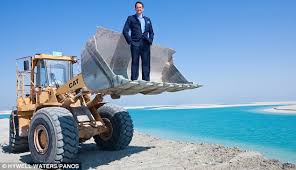
For the first time in this blog I am personally involved in the topic I am bringing up for a post...I could also add dramatically involved, if we look into the cold numbers that this not long ago promising country is yielding nowadays.
A blog about daily thoughts and songs which will build a soundtrack throughout the days, weeks and months of my year back in Madrid after living in the Middle East. This blog is just a wide range of topics and songs which become relevant enough(for me) as to be published. Enjoy it!




 UK-led international team of astronomers have discovered the most massive stars to date, one which at birth had more than 300 times the mass of the Sun, with the name of R136a, frankly not a very attractive name considering we are talking about the largest piece of something existing in the universe as we know it so far.
UK-led international team of astronomers have discovered the most massive stars to date, one which at birth had more than 300 times the mass of the Sun, with the name of R136a, frankly not a very attractive name considering we are talking about the largest piece of something existing in the universe as we know it so far.
 ers Kluwer.
ers Kluwer.- Availability: Libranda's services are offered through 21 online stores and it is important to note that the ebooks will not be sold directly to end customers from this platform, Libranda is targeted at bookshops, who will in turn sell to consumers.
- Price settings open: All decisions about release timing and pricing, as well as negotiations with retailers on terms and discounting, are left up to individual publishers, which enables to each seller to develop a more competitive price strategy.
- Competitive advantage in prices: For me, the most important competitive advantage of having a new and strong platform is that the average e-book from Libranda will cost 20-30% below the print book price (about 6 euros for paperbacks and 11-14 euros for hardcovers).
- Growing number of e-books: Although the initial number of 2,000 e-books available at launch seems small, Libranda hopes to grow the number of titles to 8-10,000 by year’s end.
- Large number of downloads: The number of downloads is not limited to one file, but up to 12 devices: 6 desktop and 6 mobile files protected with Adobe ACS4 DRM that a. Individual publishers can put a lower limit on the number downloads if they choose. All files will reside in Libranda’s digital warehouse and will be sold exclusively through their online retail partners.
- Possible agreement with Tech Giants: In a future second phase the platform plans to negotiate agreements to offer their e-books through tech giants Apple, Amazon and Google (though publishers will have to kick in an extra 2% for this service), and will also contemplate different models including subscription, streaming and lending.
- Potential expansion to Latin America's market: Also in the cards for the immediate future is expansion of the platform into the rest of the Spanish-speaking world, planned for early 2011. Libranda is negotiating with publishers in Latin America and hopes to work with local online retailers and booksellers (some of which have a more mature market and established customer base than their counterparts in Spain).
- Possible VAT reduction to equalize with physical books:The VAT is stuck at 18% for any book without a physical component, though the Spanish government has promised the publishers it will fight in Brussels to convince EU regulators to reduce the rate for e-books to the same preferential 4% enjoyed in Spain by paper books.
- Space for smaller booksellers: Libranda will offer marketing tools like widgets and samples, though it’s up to publishers whether or how they will use these. The platform will also create white pages for booksellers who don’t have their own retail website set up.
- New Website — http://www.libranda.com — will allow readers to search for available titles but to purchase e-books they will have to go to one of the participating online stores. Publishers using the platform will be able to use the website to manage their catalog of titles, upload new books, and access sales figures.
- Break even in about 5 years: 2 million euros have been raised to set up the platform and request exclusive digital distribution rights from all participating publishers, though with some flexibility. Planeta’s Badenes admitted that the platform expects to lose money in the beginning and likely won’t turn a profit for the first five years.
All the above presents a favorable scenario and could have been applicable to the case in 2002, and probably without the pessimistic expectations that surrounds every new venture nowadays in Spain.

What can ERP do for me?
 can be found in the image attached:
can be found in the image attached: